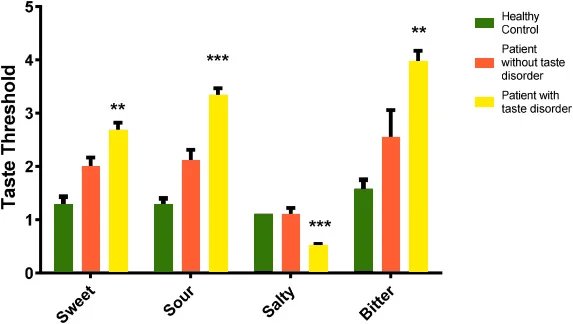
Menu
- Home
- About
- Our Team
- Services
- Postoperative Care
- Smile Gallery
- Medical Tourism
- Blog
- Offers
- Contact Us
- Home
- About
- Our Team
- Services
- Postoperative Care
- Smile Gallery
- Medical Tourism
- Blog
- Offers
- Contact Us

It is expected to have a sour taste in your mouth when you eat something bitter, such as chicory or black coffee. It is not natural to have a persistent bitter taste in your mouth, irrespective of what you eat or drink, and may signify one of several conditions of health.
It is not always a serious problem to have a bitter taste in your mouth, but this can conflict with your daily life and impact your diet.
Dry mouth is also known as xerostomia due to a decrease in salivary production or alteration in the saliva composition.
The main factors that can cause dryness in the mouth include age, medications, Sjogren syndrome (an autoimmune disease that causes excessive dryness of the eyes and mouth) as well as smoking cigarettes.
Another reason for smoking is that it can be harmful to your health. Smoking also affects the sense of taste, and could cause your mouth to have the unpleasant smell or taste. Smoking can also cause preventable illnesses and may cause death.

Acid reflux, also known as Gastroesophageal reflux disorder (GERD)
There are muscles that open and close the spaces between your stomach and esophagus.
When you eat, if that muscle fails to close properly it will allow it will be unable to close properly and the acids that are in the stomach and food particles will be transported back to the esophagus. Another reason is the bitter or bitter taste that you get in your mouth.
If you suffer from cold, sinus, or any other infection the body will naturally produce certain kinds of protein from various cells in your body. These proteins can affect the taste buds, and in the event of illness you may feel bitterness or sourness. Once you’re healed and the taste of sour goes away.

In addition to the fact that sickness or illness can leave a bitter taste in the mouth. However, also the medications you take to treat this illness contain some residuals that are excreted in saliva.
If the medicines you are taking contain metallic components such as antibiotic tetracycline lithium, and some heart medications, they can cause bitter taste in your mouth.

The estrogen hormone in women can fluctuate throughout this pregnancy. This is why they feel a metallic or bitter taste in their mouths. This bitter taste will fade out after birth.
If you don’t clean your teeth and floss regularly, you can get an unpleasant taste in your mouth. It is recommended to brush your teeth at least twice per day as well as flossing at least twice each day. Good oral hygiene will keep your taste buds healthy.
One of the most common causes of a sour taste is that you aren’t taking enough fluids. The lack of water can dry out your mouth and change the taste of your mouth. To keep your mouth hydrated take at least up to 8 glasses water each all day

A zinc deficiency can be an important reason for tasting disturbance. Zinc increases the amount of a protein known as gustin. The body utilizes this protein to create taste buds.
The zinc deficiency could be caused by a lack of zinc in the diet, poor absorption of zinc in the intestines and the use of certain regular medications.
Like the name implies, burning mouth syndrome can cause scalding, or burning sensations within the mouth, which can be extremely painful.
The symptoms could be felt in any or all areas in the mouth. They can also trigger dry mouth as well as a metallic or sour taste.

Dysgeusia in the mouth can be caused by several different factors. Many people experience a metallic taste in their mouths due to acid reflux, while others may experience a sour, bitter, sweet, or salty taste due to poor oral hygiene, high blood pressure, or certain medications.
A bad taste in the mouth can be a symptom of many different dental problems. It can be caused by periodontal disease, cavities, a dry mouth, or a build-up of bacteria in the mouth. The best way to treat a bad taste in your mouth is to visit a dentist for an oral check-up. The dentist can identify the underlying cause and provide the necessary treatment to remove the bad taste.
Fortunately, some remedies can help those suffering from this symptom.
COVID-19 has been unarguably one of the biggest roadblocks to resume a normal lifestyle, wavering many unexpected challenges, especially how certain foods taste and makes someone lose the sense of smell. As the virus progresses, many infected individuals have reported experiencing dysgeusia in their mouths due to changes in their system.
This phenomenon may be linked to the fact that certain smell and taste receptors are found within the upper respiratory tract, but it can also be a sign of other medical conditions.
It is important to note that this symptom does not appear to be linked to the severity of the illness, as some people who are only mildly ill may still experience it. Additionally, some of the drugs used to treat COVID-19 can affect taste buds, leading to an even more distinctive bitter or sour taste.

According to the study conducted in 2021,a 75 member group was separated into three different categories 1. Covid-19 patients having taste disorder 2. Covid-19 patients not having taste disorder 3. Healthy controlled group.
The study concluded that the patients who had covid positive with the taste disorder had an increased sweet, sour, bitter taste than the people who had covid 19 without taste disorder.
Furthermore these members had a decreased salt taste threshold when compared to sweet, sour, and bitter tastes than the healthy controlled group.
A bitter or sour taste can be linked to many different reasons, from as simple as poor oral hygiene to a result of different medications. Nevertheless, consult your dentist to get your oral care done at regular intervals to avoid any complications.